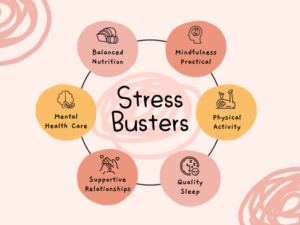Keeping Your Mind Sharp: Mental Health Tips for Our Elders
This month, as recognized by the World Health Organization (WHO), is dedicated to raising awareness about mental health. Mental health is a crucial aspect of our overall well-being, defined as the state of mental well-being that enables people to cope with life’s challenges. Good mental health allows individuals to manage stress, work productively, and contribute to their communities.
The Importance of Mental Health

Mental health is more than the absence of mental disorders. It encompasses emotional, psychological, and social well-being. It also affects how we think, feel, and act. furthermore, It helps determine how we handle stress, relate to others, and make choices. Evidently, maintaining good mental health is essential at every stage of life, from childhood and adolescence through adulthood and old age.
Risk Factors for Mental Health Disorders
Various factors can influence mental health, including:
-Hereditary Factors: Mental health disorders can be hereditary, making individuals with a family history more susceptible.
– Past Experiences: Traumatic or negative experiences, especially in childhood, can increase the risk of developing mental health issues.
– Loneliness and Isolation: Social isolation and feelings of loneliness can lead to depression and anxiety.
-Chronic Stress: Ongoing stress from work, relationships, or financial problems can affect mental health.
Mental Health in the Elderly
The elderly population faces unique challenges that can impact their mental health:
– Age: Aging can bring about physical and cognitive changes that affect mental health.
– Blood Pressure: High blood pressure is linked to cognitive decline and mental health issues.
– Isolation: Older adults often experience loneliness due to the loss of loved ones and reduced social interactions.
-Finances: Financial insecurity can cause significant stress and anxiety.
– Chronic Pain: Persistent pain can lead to depression and reduce the quality of life.
RELATED: Christian Health And Spiritual Wellbeing
Strategies for Maintaining Mental Health in the Elderly:
-Medication Management: Proper management of medications can prevent side effects and interactions that may impact mental health.
-Physiotherapy: Physical activity and exercise can improve mood and reduce symptoms of depression and anxiety.
-Peer Support: Social support from peers can provide emotional comfort and reduce feelings of isolation.
-Therapy: Various forms of therapy, including cognitive-behavioral therapy (CBT) and psychotherapy, can help manage mental health conditions.
Conclusion
Mental health is vital for everyone, and it’s important to take proactive steps to maintain it. Whether through professional support, social connections, or healthy lifestyle choices, we must prioritize our mental well-being. In addition, in this Mental Health Month, let’s commit to understanding and supporting mental health for ourselves and our communities. Taking good care of our mental health enables us to lead fulfilling lives and better cope with life’s challenges.
Content Credit/ Samuel Daniel Oluwadamilare
Picture Credit/




